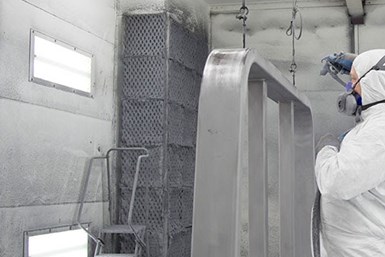Share

Proper paint booth filter disposal not only ensures your business is following the law, but it is also what is best for the environment.
Photo Credit: Global Finishing Solutions
For collision repair centers and industrial manufacturers who own a paint booth, one of the easiest ways to protect the environment is to properly dispose of paint booth exhaust filters.
Since most paint that is sprayed contains hazardous compounds and is potentially flammable, extra care must be taken when it is time to dispose of your paint booth filters. At this time, it is not possible to recycle paint booth filters. Proper paint booth filter disposal not only ensures your business is following the law, but it is also what is best for the environment.
Here are five steps for proper paint booth filter disposal:
Determine If Your Used Paint Booth Filters Are Hazardous
Before disposing of your paint booth exhaust filters as general waste, you need to verify your filters have not been exposed to any of the hazardous compounds that are frequently found in paint. You must perform a Toxicity Characteristic Leaching Procedure (TCLP) laboratory test to determine if the paint you sprayed contains specific compounds. Your filters are considered hazardous if a certain amount of any of the following compounds are present in your filters:
- Arsenic
- Barium
- Cadmium
- Chromium
- Lead
- Mercury
- Selenium
- Silver
Paint booth intake filters are designed to remove dust and other small airborne particles to supply a contaminant-free environment for painting. As long as the intake filters have not come in contact with paint, they are not hazardous. This means the intake filters can be disposed of in your normal trash.
Properly Dispose of Hazardous Paint Booth Exhaust Filters
If your paint booth exhaust filters are deemed hazardous, they should not be disposed of as standard waste. Instead, they must be properly stored and sent to a hazardous waste disposal facility. Store them in a non-leaking container marked with the words “hazardous waste” and a description of the waste, such as “waste paint booth filters.” Then, use a licensed hazardous waste transporter to ship the container to a hazardous waste disposal facility.
Before disposing of hazardous paint booth exhaust filters, you should always let them dry. Allowing your paint booth exhaust filters to dry typically eliminates the chance of ignitability. It is safest to subject the filters to the same curing process you use for painted products to accelerate drying of the filters and ensure they are completely dry before disposal.
Contact Trash Collector Before Disposing of Non-Hazardous Paint Booth Filters
Even if your paint booth exhaust filters are not deemed hazardous waste, you should notify your trash company that you are disposing of the filters as standard waste. Your trash collector may ask you to provide proof that no hazardous compounds are present in the filters. Make sure to retain documentation of the safety data sheets (SDS) of the materials you are spraying, lab test results and any other pertinent information your state recommends you keep on file.
Do Not Spray Gun Cleaners Into Paint Booth Exhaust Filters
Many spray gun and wand cleaners contain solvents that are classified as F-listed hazardous waste, including methylene chloride, methyl ethyl ketone (MEK) and toluene. This is indicated on the SDS of the solvent as F001, F002, F004 or F005.
Spraying solvents into the exhaust filters during gun cleaning can cause your filters to be considered hazardous waste. When cleaning your spray gun, make sure to keep solvents away from the paint booth filters. It is best to spray solvents into closable hazardous waste collection containers or use a gun washing system.
Test Filters Whenever You Make a Change to Your Paint Process
Determining whether your paint booth exhaust filters are hazardous waste can be an ongoing process, depending on how often you introduce new paint into your operation. Testing is required whenever parts of your painting process change.
Any time you add a new paint, you need to evaluate the paint to see if it contains hazardous compounds. Since testing can take some time, you should give yourself a buffer before you intend to spray the paint.
In Conclusion
Regulations regarding paint booth filter disposal vary from state to state and sometimes even from county to county; your local authorities can tell you the requirements for your area. Since you cannot recycle paint booth filters, considering them hazardous waste and coordinating with a hazardous waste disposal company to dispose of them properly is the safest thing for the environment.
Related Content
Conveyors and Paint Systems
Choosing the right conveyor system, coating technology, and ancillary equipment.
Read MoreHenry Ford Is Still Right When It Comes to Color
Who would have imagined that more than 100 years after his famous statement about any color as long as it’s black would still have relevance of a sort?
Read MoreCuring Oven Basics
Simply heating up the substrate does not cure the coating. There are many variables to consider when choosing the best cure oven for your application...
Read MoreConcrete Reinforced Bars Built to Last
Not all corrosion-resistant materials for infrastructure are created equally. Epoxy-coated steel rebar has advantages that other materials used to prevent corrosion do not.
Read MoreRead Next
Selecting PPE for Your Paint Shop
Guidelines for determining the appropriate personal protective equipment for a painting operation.
Read More












.jpg;maxWidth=300;quality=90)





